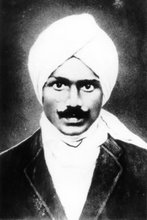சுட்டும் விழிச் சுடர் தான் கண்ணம்மா சூரிய சந்திரரோ
வட்டக் கரிய விழி கண்ணம்மா வானக்கருமை கொலோ
பட்டுக் கருநீலப் புடவை பதித்த நல்வயிரம்
நட்ட நடுநிசியில் தெரியும் நட்சத்திரங்களடீ
Transliteration
suttum vizic cudar thAn kaNNammA sUriya canththirarO
vattak kariya vizi kaNNammA vAnakkarumai kolO
pattuk karunIlap pudavai pathiththa nalvayiram
natta nadu nisiyil theriyum natcaththiranggaLdI
Meaning per word
Indicating/light of eyes/kaNNammA/(are they)sun and moon?
round black eyes/kaNNammA/sky/dark/like?
silk/violet/sari/embedded/good diamond/
very middle/night/seen/stars?
Word by word translation
suttum - Adorned or indicated. The root of the word is the verb (viNai விணை) suttu (சுட்டு). The ம் suffix transforms the verb into a peyareccam (பெயரெச்சம்), a relative participle that needs a noun to make complete sense.
viziccudar - A compund word formed from vizi (விழி) meaning eye and cudar (சுடர்) meaning flame. Thus the word denotes the light of the eyes shining like the flame of a lamp.
thAn - An intensifier used to highlight the meaning.
kaNNammA - This is a repeated name that appears on the poem (and most of Barathi's poems). kaNNammA is Barathi's fictional lover, the Beatrice to his Dante. The name literally translates as eye-mother.
cUriya canththirarO - Another compound word that translates as the sun (cUriya சூரிய) and moon (canththirarO சந்த்திரரோ). The 'O' (ஓ) suffix added to the word makes the sentence an excalamatory one.
vattakkariya - Adjectives for the follwing word. Formed by combining vattam (வட்டம்) meaning round and kariya (கரிய) meaning black.
vizi - EyevAnakkarumai - Another compound adjective.
vAnam (வானம்) means sky and karumai (கருமை) means black. Constrast the words kariya (கரிய) which is an adjective and karumai (கருமை) which is a noun form denoted in Tamil as paNbuppeyar (பண்புப்பெயர்), a name for a characteristic.
kolO - A conjunction used to complete the simile (of comparing the eyes with the sky). Can be equated to the word 'like' in English. In Tamil, this is a uvamai urubu (உவமை உருபு) or a simile participle.
pattuk karunIlap - Adjectives for the follwing word. Formed by combining pattu (பட்டு) menaing silk and karunIlam (கருநீலம்) meaning blackish blue or violet.
pudavai - sarIpathiththa - Embedded. This word comes from the root verb pathiththal (பதித்தல்). The loss of 'l' (ல்) suffix makes it a peyareccam. This is one of the standard rules for deriving a peyareccam from a verb.
nalvayiram - Good diamond. The nal (நல்) prefix acts as a qualifier. This comes from the root நன்மை, another paNbuppeyar meaning goodness.
nattanadu - The very middle. The actual word for middle is nadu (நடு). The distored form of the word - natta ( நட்ட) intesifies the word giving the very middle meaning.
nisiyil - In the night. The word for night is nisi (நிசி). The yil (யில்) suffix acts as the adverb.
theriyum - Seen. The root is the word therithal (தெரிதல்) meaning to be seen.
natcaththiranggaLadI - A slightly complex word. The word natcaththiram (நட்ச்சத்திரம்) means star, the plural form being natccaththiranggaL ( நட்ச்சத்திரங்கள்). The suffix adI (அடீ) is an intensifier used with female second persons.
History
kaNNammA is one of the prominent fictional characters in Barathi's poems. She can be looked at as the feminine aspect of kaNNan (கண்ணன்), Lord Krishna or as a personification of parAsakthi (பராசக்தி), the Universal Mother. She was Barathi's eternal lover, his permanent muse. She assumes many forms and ages in his poems. She is the supreme Goddess, the cherubic child and the graceful lover. She along with vaLLi (வள்ளி), kaNNan (கண்ணன்), kuyil (குயில்) meaning koel, etc., forms part of the plethora of recurrent characters rendered popular by Barathi.
Appreciation
The first stanza of a poem that oozes with romance. Barathi envisions kaNNammA as his young lover. Barathi's lovers are all very tender juvenile virgin girls. They are pristine girls who have their innocence intact. This is symbolic of his own vision of love - a pure and innocent path that leads to salvation. The primary rasA or emotion in this song is aRputham (அற்புதம்) or viyappu (வியப்பு), the feeling of wonder.
In any Barathi's poem there are two aspects worth noting - the use of his words and his similes. Barathi's usage of the exact word for the exact term is legendary. And in his similes, he shows his true genius as a poet with the breadth of his imagination.
Let us take the first stanza of this poem. The first few lines show an imagination of complete integrity. The light of kaNNammA's eyes has been compared to the sun and the moon. And then he follows up comparing her eyes themselves with the darkness of the skies. Thus, the eye becomes the sky in which the light resides as the sun and the moon. The darkness of the sky hints at a image of a night which is enhanced in the last line where her sari is compared to the darkness of the night.
The height of the imagination however lies in the comparison of the diamonds embedded in kaNNammA's sari with the stars of the night. This completes the entire picture of kaNNammA in our mental eye, a dusky woman who is as intriguing and enchanting as a night sky with the moon and the stars.
Observe that all over the only word Barathi uses for eyes is vizi. This is used to create the contrast with the name kaNNammA. The poem abounds in alliteration with the words 'nattanadu nisiyil', 'pattuk karunIlap pudavai'. It is this ability to create lyrical verse in such a simple form that makes Barathi's poems easily lend to musical compositions.
(To be contd.,)
Wednesday, December 13, 2006
Subscribe to:
Post Comments (Atom)


3 comments:
Was this used by A R Rahman in one of his compositions?
Yes! :) This was used in kaNdukoNdEn kaNdukoNdEn sung by Hariharan.
Brilliant! Thanks for the meaning.. I have fallen in love with the poetry..
Post a Comment